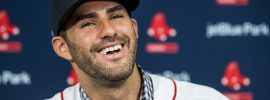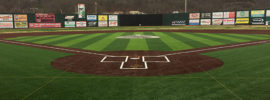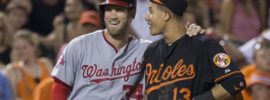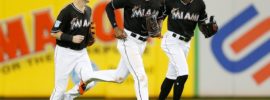In case you haven’t heard, baseball is back, and live games are being played for the first time since the sports world came to a halt due to the coronavirus pandemic. Major League Baseball is not the one playing games, however. The Korea Baseball Organization (KBO) began airing games live on ESPN Tuesday morning… 1 am in the morning.
If you haven’t heard of the KBO or seen other articles about how the KBO works, then here is a quick rundown. There are 10 teams that all play a 144-game schedule. The schedule may or may not be entirely played this season after the 6-week delayed start. The league implements a universal DH rule and ties are enforced after 12 innings. Yes, ties in professional baseball.
An Opening Day game was broadcast on ESPN as the network reached an agreement to show six games per week. The KBO probably will only be broadcast as long as American sports are still on hold, but at least there are live sports on television once again. That’s not counting esports (e-sports?), UFC pay-per-view events, or pro wrestling.
The broadcast team consisted of Karl Ravech and Eduardo Perez who were at their respective homes for the virtual commentary. They were joined by multiple guests and gave as good a presentation as they could for a league they knew little about. Despite the cultural differences between Korea and the US, baseball is still baseball (apart from the ties). The biggest difference was that there were no fans in attendance.
Although the KBO has officially begun its season, fans are not yet allowed into stadiums. It is a glimpse of what could happen in America once MLB and other sports leagues begin competing again. There was, of course, the crowdless game in Baltimore between the Orioles and White Sox in 2015. That game had no fans because of riots in the city and a fear of fans’ safety. There is a fear for safety once again, but this time it is for everybody from fans to employees to players and coaches.
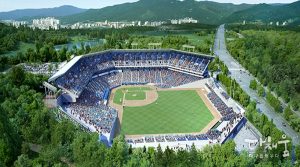 What might happen differently if MLB resumes with no fans at some point? Well it has more to do with off-the-field issues and unseen nuances rather than the play of the game itself. In an article detailing the 2015 game in Baltimore, the few people in attendance (reporters, employees, team personnel) talked about being able to hear everything. There is no casual talking where what you say blends in with the sound of the crowd. Footsteps are echoed, mitts pop even louder, and the crack of the bat is like a BP session.
What might happen differently if MLB resumes with no fans at some point? Well it has more to do with off-the-field issues and unseen nuances rather than the play of the game itself. In an article detailing the 2015 game in Baltimore, the few people in attendance (reporters, employees, team personnel) talked about being able to hear everything. There is no casual talking where what you say blends in with the sound of the crowd. Footsteps are echoed, mitts pop even louder, and the crack of the bat is like a BP session.
Batting practice might be the closest thing to the sound level one could expect apart from the pregame music that plays in stadiums. And the visual differences would be obviously empty stands with no movement or distractions around the stadium. No peanut guys. No bleacher creatures. No Marlins Man. Mascots might still be allowed in the stadium. There was one walking around in the KBO game.
TV commercial breaks will still be a thing when MLB returns. There would hopefully be less time in between innings with the league wanting to keep eyeballs on the screen as long as possible. It could also go the other way with longer commercial breaks as sponsor revenue would be a main source of income during the crowdless games.
Major League Baseball will come back when it comes back. We will still get a Spring Training Pt. II. There might not be an All-Star Game or Home Run Derby. There might be no trades allowed once the season begins. Maybe trades will be allowed all season. There might not be a traditional post season race.
No matter how many games are played, there will be a post season feeling at some point once again. There will be a sigh of relief that sports has returned, particularly baseball being played every day. There will be something to look forward to or complain about that has nothing and everything to do with our lives.
